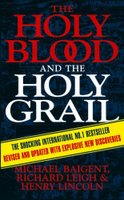

When I first heard of
"The Da Vinci Code", I thought, "Ridiculous!" Then our church decided to have an evangelistic event about it soon after the film is released on 19th May, so I thought it would be wise to read it. It is quite an exciting thriller in its own way, even though it involves a blaphemous pseudo-history of Christ. It doesn't of itself provide much evidence to contradict the teachings of Christianity, but some other books do.
At the time of reading
"The Da Vinci Code" there was a lot of controversy around a libel brought by the authors of another book,
"The Holy Blood and the Holy Grail", against Dan Brown. I have commented on this book
below and, as I noted, their attacks are pretty pathetic. (It can be bought in Sainsburys for a good price.)
Today I bought their sequel,
"The Messianic Legacy", in
Tesco for £4.99 (better than the RRP of £8.99 -
"Every little helps!"). This is probably the dodgiest book associated with
"The Da Vinci Code," because it is more of an out-and-out assault on Christianity, and it is better known than more obscure works due to the controversy.
In this book, the writers do a better job than before by trying to summarise the latest "modern Biblical scholarship" on "the historical Jesus". I take this book very seriously, even though I've only just skimmed it. Never has modern liberalism been so conveniently popularised and disseminated (by Tesco!).
Although the vast majority of believers will read it and say, "Pathetic!" some weak believers may be troubled, and all believers, esp. pastors, must be ready to strengthen their weaker brothers and sisters. Also the unbeliever who respects Christianity may be provoked to think that Christians are a bunch of charlatans. It thus adds to the current overt raging against "dangerous Christianity" by the likes of Richard Dawkins.
On the flip side, those who profess to be believers but who have dead faith (James 2) may be sufficiently disturbed by what they read to start asking questions of pastors and Christians that they know. This could be a great boon. Their spiritual weakness will be exposed and their true state may become known to them, thus leading to true conversion.
'Nevertheless the solid foundation of God stands, having this seal: “The Lord knows those who are His,” and, “Let everyone who names the name of Christ depart from iniquity.”' (2 Tim. 2:19)
'Forever, O LORD,Your word is settled in heaven.' (Psa. 119:89)
'But sanctify the Lord God in your hearts, and always be ready to give a defense to everyone who asks you a reason for the hope that is in you, with meekness and fear' (1 Pet. 3:15)
 Some believers think that using grape juice for the Lord's Supper is unbiblical, but is it? Using my faithful BibleGateway.com, I searched for wine (Greek: οινος) and found no references to the Lord's Supper. All I can find is "the cup" (Matt. 26:27; Mark 14:23; Luke 22:17,20; 1 Cor. 10:16,21; 11:25-27) and "the fruit of the vine" (Matt. 26:29; Mark 14:25; Luke 22:18). Although I myself believe in the legitimacy of taking alcoholic beverages based on the clear testimony of Scripture (Lev. 10:19; Deut. 11:14; Psa. 104:15; etc., etc.), despite the warnings associated with its consumption, I have to say that those who insist that wine is necessary have no Scriptural warrant.
Some believers think that using grape juice for the Lord's Supper is unbiblical, but is it? Using my faithful BibleGateway.com, I searched for wine (Greek: οινος) and found no references to the Lord's Supper. All I can find is "the cup" (Matt. 26:27; Mark 14:23; Luke 22:17,20; 1 Cor. 10:16,21; 11:25-27) and "the fruit of the vine" (Matt. 26:29; Mark 14:25; Luke 22:18). Although I myself believe in the legitimacy of taking alcoholic beverages based on the clear testimony of Scripture (Lev. 10:19; Deut. 11:14; Psa. 104:15; etc., etc.), despite the warnings associated with its consumption, I have to say that those who insist that wine is necessary have no Scriptural warrant.
















